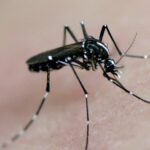
At a moment when the increasing threat of the Zika virus has brought renewed attention to environmental health issues, UMBC researchers are working on an extensive study to determine whether a neighborhood having more mosquitoes translates to a greater risk of disease transmission.
The UMBC research team led by Dawn Biehler, associate professor of geography and environmental systems, has spent several months canvassing Baltimore neighborhoods to collect data on mosquito populations and residents’ contact with mosquitoes as part of the Baltimore Ecosystem Study. They will use their research findings to draw up a set of evidence-based policy recommendations for better mosquito control to improve public health.
A March 18 article in The Washington Post highlighted this research and some of its findings.
“We see cases where there’s persistent trash and abandoned buildings, and it just creates this surface where there are lots of small bodies of water, which are just great for this mosquito,” Biehler told the Post.
She explained that she has found that many residents are concerned about the city picking up trash only once a week, but a lessening of the tax base due to population decline can lead to eroded city services. “It’s not just the city’s fault,” Biehler said. “There are bigger issues here.”
Project findings will be applied to improving mosquito control and awarding grants from the National Science Foundation to communities that have developed promising mosquito abatement strategies. The research project was also recently featured in The Baltimore Sun. Read both articles below.
Why diseases like Zika could unfairly target America’s poor (The Washington Post)
Study shows poorer neighborhoods have more mosquitoes (The Baltimore Sun)
Image: Asian Tiger Mosquito. Photo by frankieleon, CC by 2.0.





